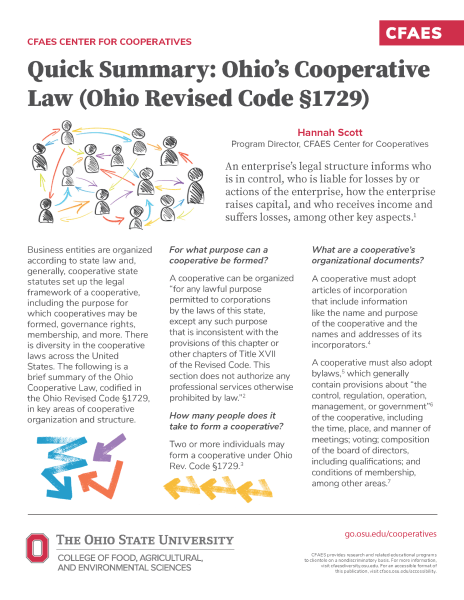As the calendar turns to a new year, it is a natural time for entrepreneurs to consider how they want to improve and to plan for the coming month, quarter, and even year. It is also a great time to review past marketing strategies and plan for the coming year. Have you thought about how you can improve your business’s marketing in the new year? Here are some thoughts to consider.
Marketing and Legal Considerations: Intellectual Property
Whether a business is thinking about entering a new market channel, wants to reach a different target customer group, is planning to refresh its website, or thinks a new social media platform would be useful, business marketing and branding can include legal considerations, including factors like content ownership and the use, protection, and monitoring of intellectual property like trademarks and copyright, among various other areas.[1]
As they market themselves and their products, businesses may create intellectual property and that may be useful to monitor or protect, depending on its value and many other factors. Also, businesses may need to use others’ intellectual property in their marketing efforts and will likely want to avoid infringing others’ property rights as they do. The following is a brief introduction to one basic area of intellectual property, copyright, and may be helpful. As small businesses develop or update their marketing plans, it may be useful to consult with an attorney about potential intellectual property needs.

Introducing Copyright Basic Concepts
What is copyright?
Copyright law protects “original works of authorship fixed in any tangible medium of expression. . . “[2] In general, a copyright gives the owner legal rights to reproduce copies, distribute copies, display or perform a work, and develop derivative works.[3]
Some examples of copyrightable works include: websites, pictures, advertisements, musical recordings, business plans, software, sales presentations, and more! Facts and ideas are not copyrightable.[4]
Who owns a copyright?
In general, initially the author of a copyrightable work owns the copyright.[5] However, an employer generally owns the work created by its employees in the scope of their employment.[6] Further, when a certain type of copyrightable work is specially ordered or commissioned from an independent contractor, the party who commissioned the work owns the copyright if there is a written agreement to that effect.[7] Copyright owners can transfer parts or all of their ownership.[8]
How is a copyright created?
When a work that qualifies for copyright protection (e.g., the work is original and expresses a minimal level of creativity) is “fixed in a tangible medium” (for example, when it is written, recorded, or saved in a digital format), it is protected by copyright. As one guide for entrepreneurs put it, “No action is required to obtain copyright protection,” and while a copyright notice may be advisable, it is not a legal requirement.[9] However, registration of a copyright can confer additional rights and benefits, including the right to sue for infringement.[10]
Social Media Platforms and Intellectual Property
Social media platforms offer various opportunities for small businesses to market their products and services, like the ability to connect with large audiences for little or no cost.[11] As entrepreneurs use social media platforms to market their products, services, or businesses, they should be aware that these platforms may have specific policies related to intellectual property. For example, TikTok’s Intellectual Property Policy states that it is a violation of the platform’s Terms of Service and Community Guidelines to post, share, or send content that violates or infringes another’s copyrights, trademarks, or intellectual property.[12] For a deeper dive into music use on TikTok, check out the article, “Music Licensing in the Age of TikTok.”
Developing a Marketing Plan
 As businesses consider their marketing opportunities for the coming year, a written marketing plan may help keep ideas organized, track progress, and communicate plans with key team members. Some questions to consider in developing a marketing plan include:
As businesses consider their marketing opportunities for the coming year, a written marketing plan may help keep ideas organized, track progress, and communicate plans with key team members. Some questions to consider in developing a marketing plan include:
- What is the profile of your target customer(s)?
- What product or service are you marketing?
- What is your advantage compared to competitors?
- What promotion strategies will you use?
- What are your sales goals or forecast?
- How will you measure outcomes and success?
Tools and Resources for Entrepreneurs
As entrepreneurs build digital marketing strategies, they will likely need images, videos, graphics, and other content. Various online outlets offer imagery like photos, illustrations, graphics, and video, as well as sound like music and sound effects, that are licensed for users to use for little or no cost.
Want to learn how to build a website for your business or enhance your social media marketing strategies? Connect with the Small Business Development Center at The Ohio State University South Centers, which covers a 10-county region in southern Ohio.
Looking for help developing or updating a marketing plan for your small business? Connect with your local Small Business Development Center (SBDC). SBDC’s offer free business consulting and at-cost training to small businesses across the country. Find your local SBDC online here.
Food and farm entrepreneurs who want to learn more about direct marketing their products can explore the Ohio State University Extension Direct Food & Agricultural Marketing program, including online resources like webinar recordings and short videos.
Important note: This information is provided for educational purposes only. It is not legal advice and is not a substitute for the need to consult with an appropriately licensed attorney.
Sources:
[1] “The Legal Implications of Social Media Marketing & Advertising.” (n.d.). Pillsbury Winthrop Shaw Pittman LLP. https://www.pillsburylaw.com/images/content/1/0/v2/102362/FACTSHEET-SocialMediaMarketingAdvert.pdf
[2] 17 U.S.C. §102
[3] 17 U.S.C. §106
[4] Bagley, C. & Dauchy, C. (2012). “The Entrepreneur’s Guide to Business Law: 4th Edition.” South-Western, Cengage Learning: Mason, Ohio.
[5] 17 U.S.C. §201(a)
[6] 17 U.S.C. §201(b)
[7] Circular 30: Works Made for Hire. (2021). United States Copyright Office. https://www.copyright.gov/circs/circ30.pdf
[8] 17 U.S.C. 201(d).
[9] Bagley, C. & Dauchy, C. (2012). “The Entrepreneur’s Guide to Business Law: 4th Edition.” 534. South-Western, Cengage Learning: Mason, Ohio.
[10] Id.
[11] Fountain, T. (Jan. 25, 2021). “Why Small Businesses and Startups Should Invest in Social Media Marketing.” Forbes. https://www.forbes.com/sites/forbesbusinesscouncil/2021/01/25/why-small-businesses-and-startups-should-invest-in-social-media-marketing/?sh=3e686afe563e
[12] Intellectual Property Policy. (June 7, 2021) TikTok. https://www.tiktok.com/legal/copyright-policy?lang=en










 As businesses consider their marketing opportunities for the coming year, a written marketing plan may help keep ideas organized, track progress, and communicate plans with key team members. Some questions to consider in developing a marketing plan include:
As businesses consider their marketing opportunities for the coming year, a written marketing plan may help keep ideas organized, track progress, and communicate plans with key team members. Some questions to consider in developing a marketing plan include:




 Generational changes are often a topic in popular culture. Think about the many popular press articles about changes in
Generational changes are often a topic in popular culture. Think about the many popular press articles about changes in 
